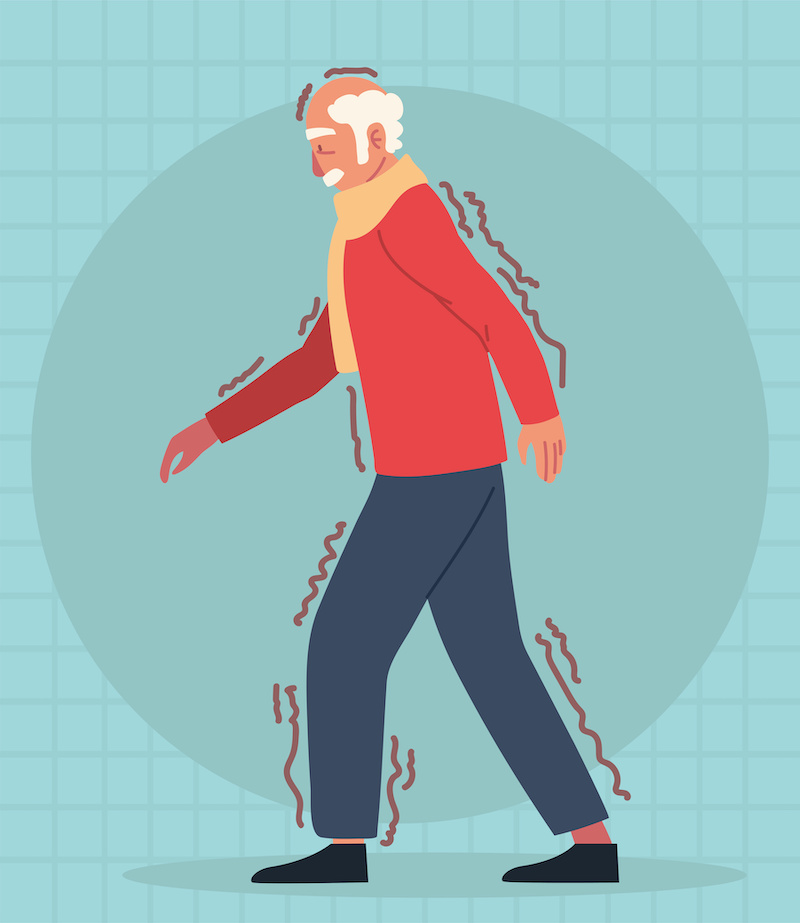 Parkinson’s disease, a neurodegenerative disorder affecting movement, can creep into a loved one’s life seemingly overnight. But for those closest to the patient, subtle changes may offer a clue. Spouses and partners are often the first to notice the early signs of a Parkinson’s tremor, which can be easily dismissed as normal aging. This blog explores the early symptoms, the importance of early diagnosis, and how to navigate these sensitive conversations.
Parkinson’s disease, a neurodegenerative disorder affecting movement, can creep into a loved one’s life seemingly overnight. But for those closest to the patient, subtle changes may offer a clue. Spouses and partners are often the first to notice the early signs of a Parkinson’s tremor, which can be easily dismissed as normal aging. This blog explores the early symptoms, the importance of early diagnosis, and how to navigate these sensitive conversations.
Movement and Speech: Beyond the Expected Tweaks
A tremor in a resting hand is a classic sign, but it’s not the only one. Look for a tremor that persists, especially when relaxed. Another early indicator is bradykinesia, or slowness of movement. Simple tasks like getting dressed or buttoning a shirt may take significantly longer and require more effort. Rigidity, a feeling of tightness or restricted movement, can affect any part of the body, leading to a stooped posture or a shuffling gait. Balance problems and falls are also common, so be observant if your partner seems unsteady or trips more frequently. Changes in speech can be subtle but significant. Speech may become softer, slurred, or monotone.
Dementia and Beyond: A Spectrum of Symptoms
 While not everyone with Parkinson’s experiences dementia, it can occur in later stages. Early signs might include forgetfulness, difficulty concentrating, or problems with planning and organizing. Another concerning symptom is sleep disruption. Restless sleep, frequent urination at night, and daytime fatigue can be early indicators of Parkinson’s, even if they have other explanations.
While not everyone with Parkinson’s experiences dementia, it can occur in later stages. Early signs might include forgetfulness, difficulty concentrating, or problems with planning and organizing. Another concerning symptom is sleep disruption. Restless sleep, frequent urination at night, and daytime fatigue can be early indicators of Parkinson’s, even if they have other explanations.
Responding with Empathy and Encouragement
If you suspect Parkinson’s, address it with your partner in a loving and supportive way. Choose a calm moment and express your concerns, focusing on specific observations rather than accusations. Emphasize the importance of early diagnosis and treatment, and offer to accompany them to the doctor. Open communication and a supportive environment are crucial, as the diagnosis journey can be emotionally challenging.
Early Diagnosis: A Time Advantage
Early diagnosis of Parkinson’s is crucial. There’s no cure, but medications and therapies can significantly improve quality of life by managing symptoms. Early intervention can also help with emotional well-being and planning for the future. A neurologist can perform a comprehensive evaluation to confirm the diagnosis and recommend a treatment plan.
Estate Planning for the Future: Legal and Financial Security
Parkinson’s is a progressive disease, so planning ahead is essential. Contact your elder law attorney who can guide you and give you specific advice regarding planning for Parkinson’s disease. A California Health Care Directive should be prepared, with immediate powers, which authorizes someone to make medical decisions on your partner’s behalf if you become unable to do so. Your Revocable Living Trust and Financial Durable Power of Attorney should be up to date, preferably with immediate powers, and should have provisions for your care should you become incapacitated or suffer from dementia.
Financial Solutions: Addressing Long-Term Care Costs
 Parkinson’s disease can be a significant financial burden. Researching long-term care financial solutions early can help offset future costs. Additionally, exploring government assistance programs and veteran’s benefits (if applicable) can provide additional support.
Parkinson’s disease can be a significant financial burden. Researching long-term care financial solutions early can help offset future costs. Additionally, exploring government assistance programs and veteran’s benefits (if applicable) can provide additional support.
Beyond Diagnosis: Support and Resources
Remember, you’re not alone in this journey. Support groups and educational resources from organizations like the American Parkinson Disease Association https://www.apdaparkinson.org/ and the Michael J. Fox Foundation https://www.michaeljfox.org/ can be invaluable sources of information and guidance. By being observant, supportive, and proactive, you can help your partner navigate an early Parkinson’s diagnosis and live a fulfilling life for as long as possible.
About Walnut Creek Elder Law in Walnut Creek, California
Michael J. Young is an experienced elder law, estate planning and asset protection planning attorney in Walnut Creek, CA. Mr. Young advises his clients regarding their estate planning needs with an emphasis on asset protection, Medi-Cal qualification, and preservation of assets for various levels of their care as they get older. Mr. Young’s journey into elder law began when his mother suffered from an acute injury that required her to be in a skilled nursing facility. He is co-author of the book, Don’t Go Broke in A Nursing Home and is the author of the “Alzheimer’s Legal Survival Guide.” Mr. Young presents monthly workshops in Walnut Creek regarding estate planning, asset protection, and Medi-Cal planning. He has helped many clients over the years successfully qualify for Medi-Cal and has protected their assets from state recovery. Call today to schedule a consultation (925) 256-0298.

